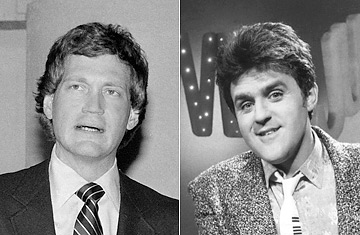
Comedians David Letterman and Jay Leno
(5 of 5)
It was a tragic punch line to a story that had turned darker than anyone had bargained for, and it added to the bitterness against Mitzi. When she walked into her office the day after the suicide, Mitzi found a poster of Lubetkin propped up on her couch, and the words "Got the Message" scrawled in Magic Marker on her wall. Lubetkin's girlfriend had left it.
Lubetkin's troubles clearly went beyond Mitzi Shore and the strike. "He obviously had some deep-rooted psychological problems," says Richard Lewis, a friend since their days together at the Improv in New York. "Also an unbearably bad run of luck." Lubetkin had missed out on several TV opportunities, including a heartbreaking mishap with The Tonight Show. After he had been booked to make his first appearance on Carson's show, Lubetkin was cutting up onstage late one night at the Comedy Store when a Tonight producer happened to be in the audience. The producer didn't like what he saw, and Lubetkin's guest spot was canceled.
The strike worsened his relations with Mitzi. While it was underway, Lubetkin was scheduled to work a five-night engagement at the La Jolla Comedy Store (which was not affected by the strike), but he showed up late on opening night and Mitzi canceled the gig. Lubetkin said his car broke down; Mitzi was upset because he had stopped off first at the Sunset club to walk the picket line. But after his death, she angrily denied any implication that she bore some responsibility. "I was very close with Steve Lubetkin," she says. "I loved him. He was my best friend. I was in La Jolla at the Comedy Store and when I got the message [of his suicide], I threw glasses around. I had a fit, that he would do a thing like that." She claims Lubetkin was under too much pressure because of the organizing duties he had inherited after Dreesen left town. "He couldn't handle what they were giving him to do," she says. "He had definite problems. But the pressure of getting that responsibility was too much for him." Dreesen says he doesn't know what she's talking about.
The Comedy Store strike, with its tragic coda, was a turning point for stand-up comedy in the 1970s. In later years, the L.A. comics romanticized it as the end to an age of innocence, the dividing line between an era of happy camaraderie and a more complicated one of competing factions and big business. But it had a more important, if less obvious, impact around the country. Pictures on the evening news of stand-up comedians walking the picket line in L.A., and the news of their victory in the strike, raised the profile of a profession that was growing fast in popularity, not just on the two coasts, but in the heartland as well. The strike helped fuel the nationwide comedy club boom of the 1980s.
From Comedy at the Edge by Richard Zoglin. Copyright 2008 by Richard Zoglin. Published by Bloomsbury Publishing Plc.
